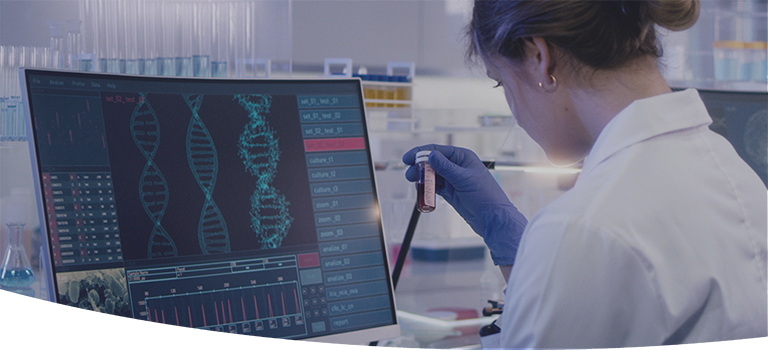Developing a less invasive, more comprehensive diagnosis method
Getting diagnosed with coeliac disease can be challenging and invasive, especially if you require an endoscopy and biopsy.
Thanks to Coeliac UK’s Research Fund, Nonacus Ltd and researchers at the University of Cambridge are working to develop, test and manufacture a new and improved diagnosis method for coeliac disease.
As we release our Research Fund Impact Report, Nonacus share their achievements so far.
What does the project hope to achieve?
Coeliac disease is currently diagnosed using antibody blood tests and in most cases, an endoscopy and biopsy. Both tests are only reliable when gluten is present in the diet and examination of biopsy samples for diagnosis is time consuming and subjective, meaning experts can disagree about the diagnosis.
Our research team hopes to improve the diagnosis of coeliac disease by developing a less invasive, more comprehensive diagnostic test, working in collaboration with researchers at the University of Cambridge, led by Dr Elizabeth Soilleux.
This project is testing the use of sequencing the DNA of immune cells called lymphocytes, which are involved in the body’s reaction to gluten. The two main types of lymphocytes are T cells and B cells and they express cell surface receptors. These receptors initiate an immune reaction in response to gluten.
People with coeliac disease have lymphocytes with specific DNA profiles – and this profile doesn’t change, whether they have eaten gluten recently or not. The test uses Cell3™ Target technology combined with a custom designed probe panel to capture specific regions for sequencing. When used along with a bespoke computer algorithm (patent pending) it can identify patients with coeliac disease by predicting how likely their immune cells are to respond to gluten.
As a company committed to developing non-invasive genetic testing products, our Research & Development has been focused on the areas of prenatal testing and oncology. Without the generous grant from Coeliac UK and Innovate UK we would not have considered starting this important work”
What stage is the project in?
Three phases of the project have now been completed, including:
- Using DNA extracted from blood and frozen tissue samples in experiments to develop and optimize the laboratory process
- Working to understand the minimum DNA concentration needed
- Looking at how well the test works on difference samples
How many samples have been processed?
So far, 231 samples have been processed through this novel method. These are a mix of control samples, from people without coeliac disease and gut biopsies and blood samples from coeliac disease patients.
We are really pleased that so far, we have shown that the method works using gut biopsy samples. If a simple blood test can be offered to diagnose coeliac disease without the need for endoscopy and biopsy this would be a huge benefit. The University of Cambridge is now analysing this data to see if the test works using blood samples.
Nonacus will also be processing another 174 gut biopsy samples to confirm that the method is truly robust for recognising coeliac disease patients versus non-coeliac disease patients.
One of the most important benefits of this test is that it will not require people to eat gluten during testing. It will also provide a much clearer yes/no answer compared with the current investigation of biopsies where experts can disagree.”
Why has the project been delayed?
The past 16 months have been a challenging time due to the pandemic, both in terms of resourcing (staff and equipment redistribution) and obtaining lab supplies.
During this time we have been extremely busy helping out with covid-19 testing, we have been manufacturing testing kits for government-approved laboratories to use and have also been processing over half a million samples ourselves as a government-approved testing laboratory. All of which has resulted in a delay to project delivery.
Due to the overwhelming need to help with covid-19 testing, our clinical service laboratory has significantly scaled its operation which is something we very much hope and look forward to using to offer the coeliac disease test once developed and validated thoroughly.
This project is funded by Coeliac UK and Innovate UK. For more information, watch this interview with Head of Research & Development at Nonacus, Dr Michael Parks:
Check out our Research Fund Impact Report to learn more about Coeliac UK’s Research Fund and how your donations are helping to create a better future for people with coeliac disease.
Read Impact Report
